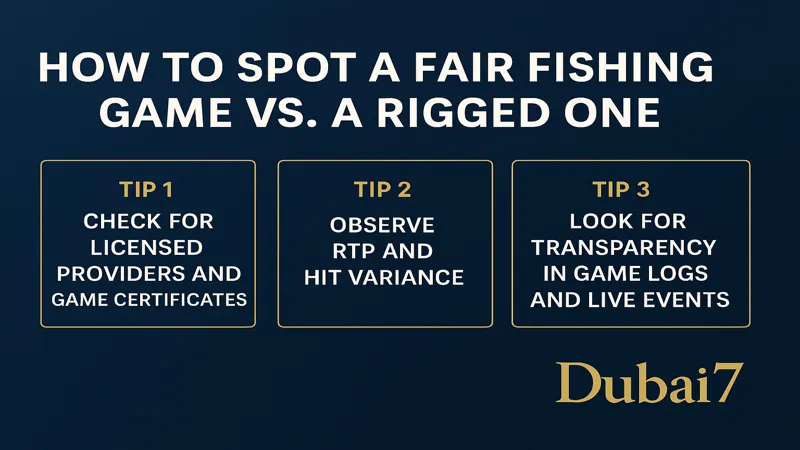
Why Fairness Matters in Fishing Games
In the fast-growing world of online arcade-style fishing games, fairness is everything. With players spending real money to fire virtual bullets at digital sea creatures, the line between entertainment and exploitation can easily blur. This is why platforms like Dubai7 emphasize certified randomness and transparency in all their fishing games.
Unfortunately, not all platforms play fair. Some games are manipulated through hidden algorithms, giving players little or no real chance to win. Learning how to identify a fair fishing game versus a rigged one can protect your time, money, and enjoyment.
Here are three essential techniques to help you tell the difference.
Tip 1: Check for Licensed Providers and Game Certificates
One of the easiest ways to verify if a fishing game is fair is by checking whether it’s developed by a licensed game provider and if the game holds any certification from testing agencies.
Reputable platforms like Dubai7 only partner with game developers certified by independent bodies such as:
- iTech Labs
- Gaming Labs International (GLI)
- eCOGRA
These agencies test and certify the game’s RNG (Random Number Generator), ensuring that bullet hits and payouts are not predetermined or rigged.
Certification Checklist
| Indicator | Fair Game (Dubai7) ✅ | Rigged Game ❌ |
|---|---|---|
| RNG Certification (GLI, iTech) | ✅ Shown in game info | ❌ Missing or vague |
| Developer Transparency | ✅ Known providers | ❌ Unknown studios |
| Game License | ✅ Listed clearly | ❌ Hidden or absent |
If a game lacks transparency in these areas, it’s a strong sign that it may be operating unfairly.
Tip 2: Observe RTP (Return to Player) and Hit Variance
Fair fishing games will always publish their RTP—a percentage showing how much of the total player wagers are expected to return as winnings over time. On Dubai7, this number is always available within the game’s information panel.
For example, a fair game may display:
- RTP: 96.5%
- Variance: Medium
- Max Win: 1,000x per shot
Rigged games typically omit this data entirely or list extremely low RTPs (e.g., 75–80%) without disclosure. Worse, they may simulate hit animations without actual winning mechanics.
Key Metrics Comparison
| Metric | Fair Game on Dubai7 | Suspicious Game |
|---|---|---|
| RTP Range | 95–97% | Below 85% or not listed |
| Fish Hit Logic | Randomized via RNG | Triggered by hidden patterns |
| Boss Fish Behavior | Occasionally defeated | Almost never defeated |
If every boss seems impossible to beat, no matter your strategy or ammo level, you might not be playing a fair game.
Tip 3: Look for Transparency in Game Logs and Live Events
Platforms like Dubai7 empower players by providing detailed logs of in-game activity:
- Coins spent per bullet
- Damage dealt and rewards earned
- Jackpot triggers and payout history
These logs allow users to verify their own session fairness. Additionally, Dubai7 features public win boards, displaying real-time jackpot winners and tournament results. These indicators foster trust and show the platform isn’t hiding anything.
In contrast, shady platforms rarely provide such data. Instead, players are left in the dark about how and why they’re winning—or not.
Visibility Features
| Transparency Element | Dubai7 ✅ | Suspicious Platform ❌ |
|---|---|---|
| Game session log | Available | Not available |
| Live jackpot display | Real-time board | Hidden or fake data |
| Player support on fairness | 24/7 available | Unresponsive |
FAQs
Q1: Can a game claim to be fair without showing its RNG certificate?
A: Technically yes, but that’s a red flag. Dubai7 only hosts games from certified providers and displays documentation openly.
Q2: Why do I keep missing big fish even with high ammo?
A: In fair games like those on Dubai7, randomness governs outcomes. If you consistently miss with no wins or payout cycles, the game might be rigged.
Q3: Are all new platforms suspicious?
A: Not necessarily. But if they lack license info, RTP display, or developer transparency, caution is advised.
Q4: What is a “hit animation” scam?
A: Some rigged games simulate the look of a hit (fish reacts, flashes), but do not actually credit the win—misleading players.
Q5: Is it safer to play games hosted by well-known platforms like Dubai7?
A: Absolutely. Dubai7 prioritizes fairness, works only with regulated providers, and displays audit and RTP data for each game.
Conclusion
With the growth of online fishing games, so too comes the risk of manipulation and dishonesty. But by using these three tips—checking certification, analyzing RTP, and verifying game transparency—you can confidently choose fair games and avoid being cheated.
Dubai7 stands as a model for how fishing games should be: transparent, randomized, and player-first. Don’t settle for less—play smart, and protect your bankroll by playing on platforms you trust.

